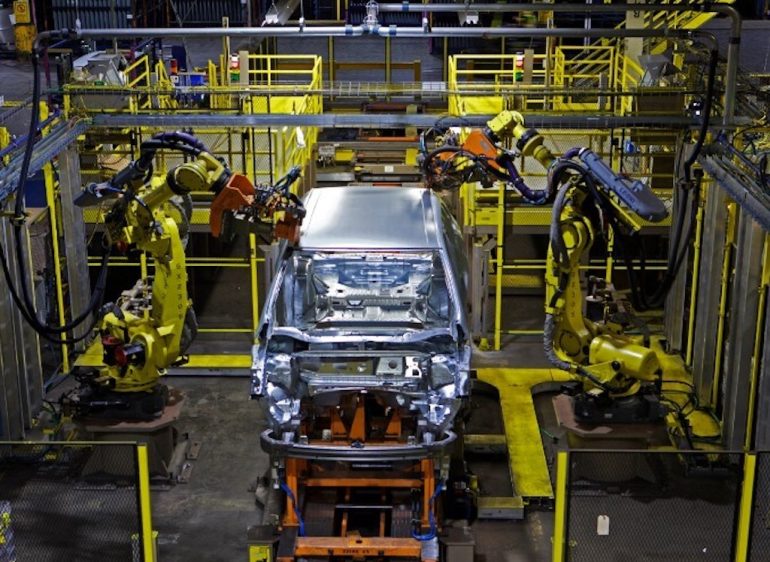How President Trump’s Tariffs on Canada and Mexico Might Reshape the U.S. Auto Business : Automotive Addicts
Automotive

President Donald Trump has as soon as once more turned to tariffs as a coverage software, this time focusing on car imports from Canada and Mexico with a 25% levy, alongside a ten% tariff on imports from China. The transfer, which formally went into impact on Tuesday, is geared toward pressuring each nations to curb unlawful immigration and fentanyl trafficking into the USA.
Whereas these tariffs are framed as a nationwide safety and financial measure, their fast affect will probably be felt within the auto business, the place provide chains and manufacturing are deeply intertwined throughout North America. In accordance with knowledge from the Mexican Automotive Producers’ Affiliation and the Canadian Car Producers’ Affiliation, practically 90% of autos produced in these international locations are exported to the U.S.—making this a high-stakes shift for automakers, suppliers, and customers.
The Impression on Detroit and American Jobs
Few locations will really feel the affect of those tariffs as a lot as Detroit, the historic middle of U.S. auto manufacturing. The Detroit Regional Chamber and its MichAuto division issued a press release warning that the tariffs may harm Michigan’s economic system, disrupt manufacturing, and enhance car prices for American customers.
“Our economies are inextricably linked by manufacturing and plenty of different essential industries,” mentioned Glenn Stevens Jr., government director of MichAuto. “Whereas the administration works to stem the movement of illicit medicine and unlawful immigration, utilizing punitive tariffs is counterproductive to commerce. The patron will in the end bear the associated fee, from showroom costs to on a regular basis items.”
As an alternative of tariffs, business leaders are urging the administration to think about revisiting commerce agreements just like the United States-Mexico-Canada Settlement (USMCA) and dealing immediately with automakers to search out different options that defend jobs with out stifling commerce.

UAW’s Shawn Fain: Tariffs Ought to Shield Jobs, Not Be Used as a Political Device
United Auto Staff (UAW) President Shawn Fain took a measured however essential stance on the brand new tariffs. Whereas the union has lengthy supported robust commerce insurance policies to guard American jobs, Fain made it clear that tying tariffs to immigration and drug coverage is the flawed strategy.
“The UAW helps aggressive tariff motion to guard American manufacturing jobs,” Fain mentioned in a press release. “However we don’t help utilizing manufacturing unit staff as pawns in a battle over immigration or drug coverage.”
Fain famous that whereas tariffs may very well be used to stop plant closures and restrict company outsourcing, they need to be half of a bigger pro-worker technique, not only a political maneuver. He additionally referred to as on the administration to renegotiate commerce offers like NAFTA and USMCA to additional strengthen American labor protections.
Which Automakers Will Be Hit the Hardest?
In accordance with a Reuters evaluation, practically each main automaker with operations in Canada and Mexico will probably be affected. Right here’s how the tariffs may affect manufacturing and pricing throughout the business:
BMW
- BMW’s plant in San Luis Potosí, Mexico, produces the three Sequence, 2 Sequence Coupe, and M2, with a good portion heading to the U.S.
- The corporate is ready to start constructing its all-electric Neue Klasse fashions there in 2027, which may additional complicate commerce relations.
Ford
- Ford operates three vegetation in Mexico, exporting practically 196,000 autos to the U.S. within the first half of 2024.
- In Canada, Ford’s Oakville meeting plant is slated to construct a brand new gas-powered F-Sequence truck from 2026, a mission that would now face uncertainty.
- Whereas Ford has not issued an official assertion, the corporate has beforehand expressed considerations about tariffs disrupting provide chains.
Common Motors (GM)
- GM imported roughly 750,000 autos from Canada and Mexico in 2024, together with a few of its best-selling fashions:
- Chevy Silverado and GMC Sierra pickups
- Chevy Equinox EV and Blazer EV, each inbuilt Mexico
- GM’s CFO Paul Jacobson acknowledged that the corporate has a “playbook” to reply to tariffs, together with adjusting stock ranges and shifting manufacturing if vital.
Honda & Nissan
- Honda exports 80% of its Mexican manufacturing to the U.S. and has warned it could rethink manufacturing investments if tariffs stay.
- Nissan builds the Sentra, Versa, and Kicks in Mexico and produced over 500,000 autos there within the first 9 months of 2024.
Toyota
- Toyota’s Tacoma pickup truck is solely inbuilt Mexico, with over 230,000 models bought within the U.S. in 2023.
- The 25% tariff may result in important worth hikes or manufacturing changes.
Stellantis (Chrysler, Jeep, Ram, Dodge)
- Stellantis has two meeting vegetation in Mexico producing the Jeep Compass and Ram vehicles.
- In Ontario, Canada, Stellantis’ Windsor and Brampton vegetation are present process retooling, with future fashions probably impacted by the tariff choice.
Volkswagen & Audi
- Audi’s Q5 SUV, inbuilt San Jose Chiapa, Mexico, noticed practically 40,000 models exported to the U.S. within the first half of 2024. A 25% tariff may make these fashions considerably dearer.
- Volkswagen’s large Puebla, Mexico plant, which produces the Jetta, Tiguan, and Taos, can even be affected.
What Occurs Subsequent?
Whereas automakers scramble to evaluate the affect, one factor is obvious: these tariffs will drive up prices, with customers doubtless paying extra for autos within the close to future. Business specialists predict:
- Increased Costs: A 25% tariff on autos from Canada and Mexico may add hundreds of {dollars} to the price of some fashions.
- Manufacturing Shifts: Some automakers could transfer manufacturing again to the U.S., however this course of takes years and requires main funding.
- Political & Authorized Challenges: Count on pushback from Congress, commerce teams, and even automakers themselves, probably resulting in new negotiations.
With the 2024 election cycle in full swing, the tariff debate is way from over. The approaching months will reveal whether or not these insurance policies strengthen American jobs or create unintended financial fallout for the auto business and customers alike.
FOLLOW US TODAY:






